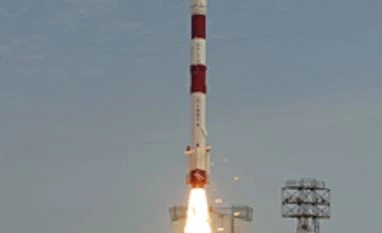The successful launch of five British satellites by (Isro)’s Polar Satellite Launch Vehicle (PSLV) rocket PSLV-C28 will bring in more orders for the space agency's commerical arm Antrix Corporation, but capacity constraints may play spoilsport, say senior Isro officials.
Antrix, which completed the heaviest commercial launch (1,440 kg) on Friday, has contracts to launch 28 more satellites in the next two to three years.
"We have till date completed commercial launch of 40 satellites from 19 countries and with the successful launch of these five satellites today, we still have 28 more satellites from six to seven countries to be executed in the next three years. And more and more customers are coming to us for launch," said V S Hegde, chairman cum managing director, Antrix Corporation Ltd.
The corporation will launch one more commercial satellite for Singapore this year.
Isro's workhorse PSLV has a capacity to carry load of up to around 1,800 kg, and the contracts are for various types of satellites, from nano, micro to normal.
The scale of commercial activities though will be determined by how much capacity is earmarked for national projects and commercial projects. Isro, over the years, has been earmarking one fourth or one fifth of launches for commercial customers, and whenever there is space capacity, it is used for commercial launches, he added.
More From This Section
When asked whether Isro would get more contracts post the latest launch, Isro chairman A S Kiran Kumar said that the organisation has to tackle capacity issues even if more contracts come.
"If we are looking for more launches for commercial purposes, one of the issues we need to tackle is the capacity to build more vehicles and do launches on time. We are working on increasing the frequency of launches from Sriharikota and also trying to increase the realisation of a larger amount of large vehicles in the given time," he said.
The SHAR at Sathish Dhawan Research Centre at Sriharikota has two launch pads at present and Isro need to look at using the maximum capacity available before going for a new one, he added.
"So far we have been doing four to five launches a year and we need to go up to 10 launches a year," he said. When asked about the status of building another launch pad, he said Isro is first looking at optimising the capacity available.
While the value of the upcoming contracts for 28 satellites is not known, the company posted revenues of Rs 1,850 crore in 2014-15, while it was around Rs 1,600 crore during the previous year. The revenue is from a whole host of services offered by Antrix, including launch services. While the company earlier built a couple of satellites for other players, lately no such deals have happened.
Isro chairman refused to comment on the revenue Antrix earned through Friday's launch, though agreeing that such business contributions are financially helping the organisation.
)